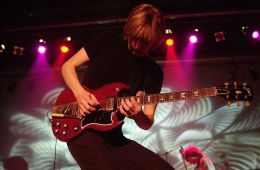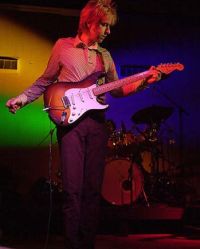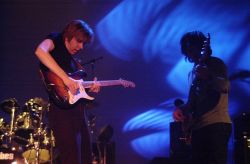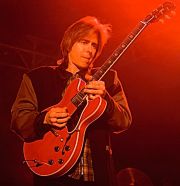|
Grammy-winner Eric
Johnson is a solo guitarist most notably known for his song "Cliffs
of Dover" on
the 1990 release "Ah Via Musicom." He has
toured with Joe Satriani and Steve Vai on the highly successful G3 tour
that started in 1996.
On Johnson's recent
tour, we had the opportunity to interview him before his show at The
Paradise Rock Club.
Boston Beats: How did you get
into music?
..
Eric Johnson: I started
playing piano when I was really young because my parents pushed me into
that until I was 11 and then took up guitar because of all the rock music
going on and all the people you'd see and thought that was really cool. I
have loved it ever since. Since then, I've been immersed into all the
different players and kept exposing myself to different styles and
different music.
BB: Who are you currently
listening to?
...
EJ: I've been listening to Pat Methany, Miles Davis, Jet... all sorts of
stuff.
BB: Who are your main
influences?
...
EJ: There are a lot players
out there who I've found influential such as Chet Atkins, Wes Montgomery,
Jimi Hendrix, Jerry Reed, John McLaughlin, Eric Clapton and Jeff Beck.
There's a lot of different ones.
 BB:
Tell us about your style. BB:
Tell us about your style.
...
EJ: I like to take different
people's styles and mix them all together and create my own. I'll take
somebody's guitar tone and use that with somebody else's technique and
somebody else's choice of lines to put it all together to make your own
style. It's impossible to be totally original so you just have to find a
different way to amalgamate all the different stuff together to make your
own thing.
BB: To
those who follow your music, it's common knowledge that you're a real perfectionist when it comes
to being in the studio and have been known to spend years on putting an
album together. What is your
recording process?
...
EJ: It's been a realization
now that my best stuff comes out when I'm in good shape practicing and get
everything down on the first, second or third take. I finally realize
there's a certain spirit energy with that. When doing things over and over
again, there is a certain calculation of the mind and it is a different
effect and vibe. I'm slowly trying to get back to performing more in the
studio and getting more of a vibe.
BB: Do you prefer to play live
or in the studio?
...
EJ: Actually, I like them
both. They both can be a challenge to be in the moment and try to get your
best performance. They are different. I suppose sometimes playing live is
a little more fun because you have the crowd to help give you energy.
BB: What do you think
makes a good show?
...
EJ: Getting out of yourself
and forgetting about yourself and just getting into the music and feeling
it. When you feel the rhythm and just let go and let things just happen
naturally - usually the magic will happen then. It's when you go on stage
pre-planned and your clinching with your own agenda that you're really
limited.
BB: What's the best
show you've seen?
...
EJ: I remember seeing Peter
Gabriel back in the early 80s - that was really an incredible show. I also
saw Alison Krauss a couple years ago and that would rank up there as well.
BB: Do you have any pre/ post
show rituals?
...
EJ: I just try to stay
centered. Try to practice a little bit and warm up and get into that frame
of mind where you're not stressing, worrying, planning or getting too
calculated about what you expect. I like to just let go and get focused.
BB: Do you play the same set
list every night?
...
EJ: My set list is pretty
close to the previous night's set. We switch out songs every now and then
and add a few extra songs so we can change it up a little bit each night.
I would say 85% of the time, it's the same.
BB: Tell us about your
audience. Who attends an Eric Johnson show?
...
EJ: It's pretty varied. For
instance, on this tour when I played at the Eclipse Theater in Vermont, we
had people between 8 - 10 years old up to their 60s.
BB: What are your favorite
types of places to perform?
...
EJ: I enjoy playing at old
wooden theaters. They have a lot of history and a real vibe. Those seem to
be our best places to play although I'm pretty open-minded to play
anywhere as long as it's presented decently.
 BB:
What do you think of the current music scene? BB:
What do you think of the current music scene?
...
EJ: I think there's a lot of
good stuff out there. There will always be good quality... sometimes,
you need to wade through it and find it. I think the quality will go up
actually because all the electronic media and people being available to
compete both in film and music with anybody who has a high stature and
huge company. There's going to be an age or accessibility opportunity for
other people to compete and more of a priority put on the integrity and
quality. I think there's a less festive hold-out that might be challenging, so you have all the radio/ media conglomerates taking over and having
this big "cartel thing" where they stipulate all these rules/ regulations
that create a cookie-cutter type of thing. But within that you still find
quality and that's great but it's a bit unfortunate that if it doesn't fit
the mold, it gets thrown out with no questions asked. Maybe the days are
numbered with that because people will be able to think for
themselves more easily with the electronic media becoming stronger and
stronger.
BB: Your most recent album,
"Souvenir," was released solely on the internet. How do you see the
internet playing a role in the music industry?
...
EJ: "Souvenir" wasn't a
regular record and was just something for the fans so I didn't want to
give people the idea it was a regular record. At this point, I'll still
release albums with a record label in tandem with the internet. In the
future, I think the balance will lean over towards the electronic media. I
think it's pretty obvious that's where it's all going with Rhapsody.com,
Ibook and Apple.com. It seems to me it's just a matter of time when
there's a major transfer.

BB: Being known primarily as
an instrumentalist, what is your opinion on instrumental guitar today? Is
"shred" dead?
...
EJ: I think the most
important thing is that they have something to say musically and that
almost always has to do with the song you write or the composition or the
music or the way you layer/ orchestrate the parts and that they're
meaningful and have an impact. If you do it in a more refreshing/
re-invented way, then it's even better. Anything that doesn't quite go
that direction, it's going to be static and sound dated. Because
everybody's heard blistering electric guitar as it has been done in the
format for 35 years for the most part, it's not really going to turn heads
as much. There's really two options: take the course of jazz music where
you have a lot of improvisation (and that's the whole heartbeat of jazz) -
but within the framework, you have players that are reinventing the whole
effect and being tasty and thinking musically. That's one option that be
can used in progressive music which is not really used as much. The other
option, because people are so burnt out on
electric guitar (and understandably so), they just put it in the back of
the mix as a songwriting tool which is where that is right now. I don't
think too many people are interested in hearing someone go crazy on the
guitar unless it was someone who was really re-inventive and had something
strong musically to say.
 BB:
You've had great success to date: from being a session player to a
Grammy-winning solo artist to being named one of the
50 greatest guitarists of all time. What keeps you motivated? BB:
You've had great success to date: from being a session player to a
Grammy-winning solo artist to being named one of the
50 greatest guitarists of all time. What keeps you motivated?
...
EJ: It's the dream of
trying to find little pockets of sound on the guitar that will be, if not
really fresh or re-inventive, at least musically pleasing and interesting
and searching for that. It doesn't necessarily come for free - you have to
work at it from both ends: one end is not working at it and letting it
happen, and the other end is working hard at it. In other words, becoming
the best musician you can to avail yourself to be at the doorstep when it
does happen. That's pretty crucial to me - anything short of that, I'll
just be rehashing "Cliffs Of Dover" and I can't get surprised if people
aren't freaking out. Why should they? They've heard it. It's my
responsibility, initially, to bring something to the table that's
stimulating.
BB: In
an age where so many define success as having big houses and
fast cars, how do you define success?
...
EJ: People think that's what
it's about because that vision is still the forum and they are not
necessarily living in that situation. If they live in that situation,
they'll realize that's just not what it's about. There's nothing
fulfilling about that. The more money you have, the more money you want;
the more stuff you have, the more maintenance you have - there's nothing
fulfilling about it. There's a lot of bands that chase records deals and
when they get the deal, they think their problems are solved - but they
have a whole new set of problems. There's nothing different - you're just
switching the problems. Success is being able trying to do what you want
to do and try to at least make a living at it and get by. You can always
shoot for the stars but you have to count your blessings if you're at
least able to get by, do well, do what you want to do and maybe be able to
make somebody happy along the way. That's success.
BB: What advice would you have
for aspiring musicians?
...
EJ: I can only say what I'm
trying to do which is just try to get into your intuitive nature of what
speaks to you musically. If you just learn the book and study the radio,
you're just going to be working out of your mind and it won't have the
same depth or impact when people hear it. So if you try to develop that
intuitive sense of music, you're seeking mechanism will try to find things
that will respond on that frequency. I think that's the frequency that
everybody responds to in the more sublime sense - it's good to get into
that thing.

To learn more about national artist Eric Johnson, visit his website
at
http://www.ericjohnson.com/
*Pictures courtesy of
http://www.ericjohnson.com/
|